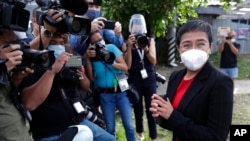A Manila court has dismissed a cyber libel charge against Maria Ressa, an award-winning journalist and founder of the Philippine news site Rappler.
The dismissal Tuesday came after Wilfredo Keng, a businessman who has filed two complaints against Ressa and Rappler, withdrew the case.
Keng filed the cyber libel charge against Ressa in 2020 over a 2019 tweet in which she posted screenshots of a Philippine Star article about Keng.
The Star did not face charges over the article in question, Julie Posetti, the global director of research at the International Center for Journalists, told VOA.
In his motion to dismiss the case, Keng said he "decided to redirect his focus towards helping out with the pandemic, instead of being preoccupied with the prosecution of this case.”
The first case that Keng filed against Rappler was related to a 2012 Rappler article alleging that Keng had links to human trafficking and drugs, which Keng denied. That case led to a 2020 conviction of Ressa and former Rappler reporter Reynaldo Santos Jr.
The dismissal of Keng’s cyber libel charge is a win for Ressa’s defense, but just a small one. Ressa still faces eight other cases.
“The order of Judge [Andres] Soriano to dismiss the case is a welcome development,” Ted Te, one of her lawyers, said to Rappler.
“I’m glad to hear good news," Ressa said to Rappler. "I look forward to seeing the rest of the cases against me and Rappler dropped in the future."
Assertive press
Despite the pressures, the Philippines has maintained a relatively boisterous, assertive and activist press that forges ahead despite state-led efforts to silence it, according to Doreen Weisenhaus, director of the Media Law and Policy Initiative at Northwestern University.
She is optimistic this tradition will continue in the face of escalating efforts to quell press freedom.
“They haven’t worked so far, in the sense that they haven’t silenced Maria Ressa. So hopefully, it won’t work,” Weisenhaus told VOA. “If we just look at the example of Maria Ressa, it hasn’t stopped her.”
Media rights activists see Ressa’s legal challenges as an example, however, of the restrictive space for journalists under Philippine President Rodrigo Duterte’s administration.
Since Duterte came to power in 2016, press freedom has remained poor in the Philippines, which Reporters Without Borders now ranks as 138th out of 180 countries, where 1 is the freest.
The dismissal was an unanticipated, positive development in Ressa’s legal fight, according to Posetti. She cautioned, though, it didn’t mean the other cases also would be dropped.
“What we have before us is ample evidence to suggest that the state is pursuing Maria Ressa in every way possible, through the courts, through other forms of intimidation and harassment,” Posetti said.
“I don’t think we can assume, based on this outcome, that the state is going to recoil, but we should be able to hope that that will happen.”
Duterte has been critical of Ressa, threatening her and calling her a “fraud.” He has also condemned Rappler as a fake news site. Duterte has rejected accusations the charges against Ressa are politically motivated.
'She's not alone'
But it’s not just Ressa and Rappler who are targeted, according to Steven Butler, the Asia program coordinator at the New York-based Committee to Protect Journalists.
“She’s not alone in facing this kind of oppression from the government,” Butler told VOA. “This is part of a broader trend.”
In one example, in 2020, the Philippine Congress voted last year to not renew the broadcasting franchise of ABS-CBN, the country’s largest broadcast network, forcing it off the air. The government has also brought what some have called questionable charges against other journalists.
Ressa’s case goes beyond the struggle for press freedom in the Philippines, Posetti said.
“It’s symbolic of the essence of struggles internationally at the intersection of freedom of expression, threats, press freedom erosion, and viral disinformation and hate speech. And that’s what this struggle really symbolizes, and it’s why it has galvanized such global support,” Posetti said.
A coalition of about 80 rights groups backs Ressa through a #HoldTheLine campaign.
The campaign welcomed the case dismissal in a statement that also demanded “the immediate withdrawal of all other charges and cases filed against Ressa and her news website Rappler.”





